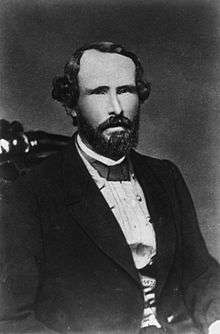Confederate States Secretary of War

The Confederate States Secretary of War was a member of the Confederate States President's Cabinet during the American Civil War. The Secretary of War was head of the Confederate States Department of War. The position ended in May 1865 when the Confederacy crumbled during John C. Breckinridge's tenure of the office.
The Secretary of War, a Confederate cabinet position, was the chief officer of the Confederate War Department. Answerable to Jefferson Davis, the Secretary of War controlled all matters regarding the army and Indian tribes,[1] and had the right to appoint as many clerks as it found necessary. This designation allowed the Secretary of War to create what eventually became the biggest department[2] in the Confederacy.[3] Related to the war effort, the Secretary of War managed important aspects of the war effort like medical distribution, engineering devices (pontoon bridges), prisoners of war and fort cessions.[4] During the war the Confederate Secretary of War’s report on the war effort became important information for the Confederate Congress and President Jefferson Davis.[5] The President had the power to appoint and fire the Secretary of War for unnecessary, dishonest and inefficient work performance. The Secretary of War was also subject to impeachment proceedings from the Confederate Congress.[6]
The Secretaries of War
Confederate President Jefferson Davis appointed Leroy Pope Walker as the first Confederate Secretary of War. Walker’s first major role involved the situation at Fort Sumter. Communicating often with P.G.T. Beauregard, he advocated for no direct clash with the Union. He also focused on the Border States, and was instrumental in ordering the muster, organization and supply of the upper states when they seceded. His stint as Secretary of War was marked by inefficiency and clashes with Jefferson Davis. His lack of experience in the military field hampered his ability to manage the war effort, and he received the blame for the early supply and organizational issues of the Confederacy. In the wake of the "failure" of the Confederate army to pursue fleeing troops after the First Battle of Bull Run, the Davis administration received lots of criticism, and Walker began to be criticized more. Walker resigned in September 1861 after a dispute with President Jefferson Davis and mounting Congressional criticism.[7]
Davis named Judah P. Benjamin acting Secretary of War the same September, and he was confirmed in November 1861. Benjamin’s addition responded to the organizational shortcomings that the War Department office was criticized for most. However, Benjamin clashed repeatedly with Confederate generals, and the downturn and increasing casualties of the war opened Benjamin up to extensive criticism. Antisemitism[8] became a strong part of this criticism, and intensified as the war effort further diminished in the eyes of the Confederate public. Davis responded to the criticism of his trusted adviser by naming him Acting Secretary of State in March 1862.
Next, Davis tapped Brigadier General George W. Randolph to succeed Benjamin, now Confederate Secretary of State. Randolph placed more emphasis on organization in the Western theater of the war, and his meticulous organization and strong work ethic[9] increased the efficiency of the War Department. However, health problems and conflict with Davis resulted in the early resignation of G.W. Randolph in November 1862. By 1862 Jefferson Davis had to replace three Secretaries of War.
Davis appointed James Seddon to the position of Secretary of War next, and Seddon would be the Confederate official to hold the position for the longest. Seddon’s reportedly "malleable" nature[10] as Secretary of War meshed perfectly with the micromanaging nature of Jefferson Davis’ interactions with the war effort. Seddon clashed repeatedly with Confederate governors, but Seddon's concurrence with Davis on the demotion of General Joseph E. Johnston caused the strongest backlash from Congress. Seddon resigned in January 1865.[11]
With the war effort disintegrating, Davis appointed John C. Breckinridge in February 1865, three months before the surrender of the Confederate Army. Breckenridge’s strong leadership led to improvements in supply and strategy,[12] but the dire situation that the Confederate army made most of his contributions minimal. His most important contribution was his opposition to pursuing a “guerrilla war” to prolong the Confederacy. With the surrender of the Confederacy, Breckinridge fled the country, abdicating his post, and was the last Confederate Secretary of War.
List
| # | Picture | Name | Born | Died | Term Began | Term Ended | Political Party |
|---|---|---|---|---|---|---|---|
| 1 |  |
LeRoy Pope Walker | February 7, 1817 Huntsville, Alabama |
August 23, 1884 Huntsville, Alabama |
February 25, 1861 | September 16, 1861 | Democrat |
| 2 |  |
Judah P. Benjamin | August 11, 1811 Christiansted, Danish West Indies |
May 6, 1884 Paris, France |
September 17, 1861 | March 24, 1862 | Democrat |
| 3 |  |
George W. Randolph | March 10, 1818 Charlottesville, Virginia |
April 3, 1867 Charlottesville, Virginia |
March 24, 1862 | November 15, 1862 | Democrat |
| 4 |  |
James Seddon | July 13, 1815 Falmouth, Virginia |
August 19, 1880 Goochland County, Virginia |
November 21, 1862 | February 5, 1865 | Democrat |
| 5 |  |
John C. Breckinridge | January 16, 1821 Lexington, Kentucky |
May 17, 1875 Lexington, Kentucky |
February 6, 1865 | May 10, 1865 | Democrat |
See also
References
- ↑ "Confederate States of America. War Dept. Communication From the Secretary of War ... : February 4th, 1863". Archived from the original on 2012-10-01.
- ↑ "The Confederate Civil Service".(1959).Van Riper, Paul and Schieber, Harry. Journal of Southern History. Southern Historical Association: Houston. ISSN 0022-4642
- ↑ "Confederate States of America. The Statutes at Large of the Provisional Government of the Confederate States of America, from the Institution of the Government, February 8, 1861, to its Termination, February 18, 1862, Inclusive; Arranged in Chronological Order. Together with the Constitution for the Provisional Government, and the Permanent Constitution of the Confederate States, and the Treaties Concluded by the Confederate States with Indian Tribes. Edited by James M. Matthews.". Archived from the original on 2013-07-20.
- ↑ "Confederate States of America. Acts and Resolutions of theSecond Sessionof the Provisional Congress of the Confederate States ...". Archived from the original on 2012-04-15.
- ↑ http://ia700403.us.archive.org/29/items/reportofsecretar15conf/reportofsecretar15conf.pdf
- ↑ "Constitution of the Confederate States of America - The U.S. Constitution Online - USConstitution.net". Archived from the original on 2014-06-26.
- ↑ "Encyclopedia of Alabama: Leroy Pope Walker". Archived from the original on 2013-05-17.
- ↑ "Judah Benjamin | Jewish Virtual Library". Archived from the original on 2014-03-28.
- ↑ "George Wythe Randolph (10 March 1818-03 April 1867)." George Wythe Randolph (10 March 1818-03 April 1867). Confederate War Department, n.d. Web. 08 Mar. 2013
- ↑ Leigh, Phil. "The Wrong Man." Opinionator The Wrong Man Comments. New York Times, 22 Nov. 2012. Web. 08 Mar. 2013
- ↑ Associated Press. "This Week in The Civil War, for Week of Sunday, Nov. 18: New Confederate Secretary of War." - The Civil War. The Times, 9 Nov. 2012. Web. 08 Mar. 2013
- ↑ History. "John C. Breckinridge Assumes Command." History.com. A&E Television Networks, n.d. Web. 08 Mar. 2013
External links
| ||||||||||||||||||||||||||||||||
